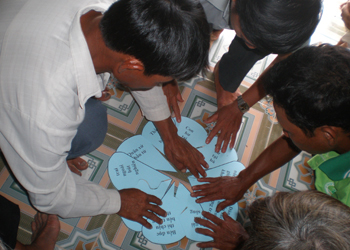 Written by Nguyen Thi Phuong Tham | Training Officer | Heifer Vietnam
Written by Nguyen Thi Phuong Tham | Training Officer | Heifer Vietnam
Edited by Nguyen Xuan Quyen | CNO | Heifer Vietnam
Ninety-four farmers, one-third of whom are women, attended a Gender Equality training held in August 2012, in the My Thanh and Binh Thanh communes, Thu Thua district of the Long An province of Vietnam.
The farmers from the Improving Farm Households’ Capacity in Long An Province project, as well as non-participants from the community, attended the training aimed to help with basic knowledge about gender equality and awareness so that they might develop new attitudes towards gender-related issues in their daily activities. The project assistant and community facilitator helped the participants differentiate between gender and sex and understand how male chauvinism can negatively affect the lives of women. Even now, the concept nhat nam viet huu, thap nu viet vo, which means one son is much more important and valuable than 10 daughters, still exists, particularly in rural areas. Men hold more high-ranking positions in the workplace than women. In families grandparents expect a grandson rather than a granddaughter, and a son usually inherits a larger amount of property than a daughter. Husbands go out to work and take part in community activities while wives stay at home, do housework and take care of the children. Most of the important family decisions are made by the husband. Many women suffer through domestic violence.
At the training, participants had the opportunity to discuss how women could be treated equally to men. Many positive attitudes came out of this discussion: husbands and wives must practice the value of sharing and caring together; family members should share the workload (housework, children, farming, etc) as well as share in the decision-making; community and families should create opportunities for women to take part in socioeconomic activities and pursue education; daughters should be treated equally and have the same rights as sons.
Participants were introduced to the issue of domestic violence, and ways to address it. In case of abuse, the women now know how to protect themselves and where to ask for help. Neighbors would know how to help those who are suffering from domestic violence.
The participants were interested in the topic of gender equality, so the project partner is holding more classes on this topic to provide deeper knowledge and to raise awareness in the community.